Teen Counseling Orlando is a form of therapy that specifically caters to the unique needs of adolescents. It provides a supportive environment for teenagers to address mental health issues, navigate challenges, and develop healthy coping strategies to thrive during this transformative stage of life.
Teen counseling focuses on helping teenagers navigate various challenges they may face, such as academic stress, peer pressure, self-esteem issues, anxiety, depression, and family conflicts.
It aims to promote their emotional well-being, develop effective communication skills, enhance problem-solving abilities, and foster healthy relationships.
Teen counselors utilize evidence-based therapeutic approaches to engage teenagers and empower them to make positive choices and overcome obstacles.
Emotional Well-being: Explore how teen counseling supports emotional well-being by providing a safe space for teenagers to express their thoughts, emotions, and concerns.
Coping Strategies: Learn about the development of healthy coping strategies through teen counseling, helping adolescents manage stress, anxiety, and other challenges.
Self-Exploration: Discover how teen counseling encourages self-exploration, enabling teenagers to gain self-awareness, identity formation, and personal growth.
Parent-Teen Relationships: Understand the role of teen counseling in improving parent-teen relationships, fostering effective communication and understanding.
Teen counseling offers a confidential and non-judgmental space for teenagers to explore their thoughts, feelings, and experiences.
It helps them develop a better understanding of themselves, build resilience, and acquire the skills needed to navigate the complexities of adolescence.
Teen counselors establish a trusting relationship with their clients, providing guidance and support as teenagers explore their identity, manage emotions, set goals, and make informed decisions.
Through the therapeutic process, teenagers gain self-confidence, improve their mental health, and develop strategies for a fulfilling and successful future.
4 Benefits of Teen Counseling Orlando
| ✅ Benefit | ✅ Description |
| ✔ Emotional Well-being | ✔ Supports teenagers in developing emotional awareness and resilience, promoting overall mental well-being. |
| ✔ Coping Strategies | ✔ Equips teenagers with effective coping skills to navigate stress, anxiety, peer pressure, and other challenges. |
| ✔ Self-Exploration | ✔ Encourages self-reflection and exploration of identity, values, and aspirations, promoting personal growth. |
| ✔ Healthy Relationships | ✔ Enhances communication, conflict resolution, and interpersonal skills, fostering positive relationships with others. |
Key Takeaway
Teen counseling provides a supportive environment for teenagers to address their emotional well-being and develop strategies for managing their emotions effectively.
Adolescents learn healthy coping strategies to navigate stress, anxiety, and other challenges they may encounter during their teenage years.
Teen counseling encourages self-exploration, helping teenagers gain a deeper understanding of themselves, their values, and their goals.
Teen counseling can improve communication and understanding between parents and teenagers, fostering healthier relationships and family dynamics.
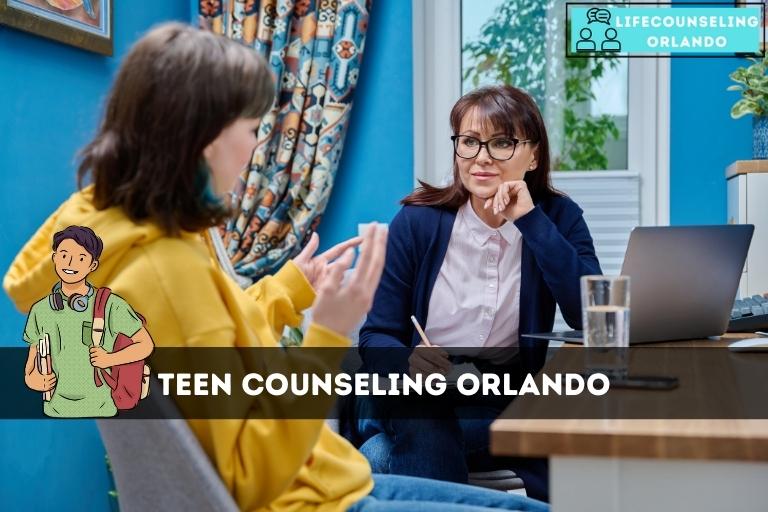
Four Facts About: Teen Counseling Orlando
Fact 1: Teen counseling utilizes age-appropriate therapeutic techniques tailored to the unique needs and developmental stage of adolescents.
Fact 2: Confidentiality is an essential aspect of teen counseling, allowing teenagers to feel safe and comfortable sharing their thoughts and experiences.
Fact 3: Teen counseling can address a wide range of issues, including academic stress, self-esteem, peer relationships, mental health concerns, and family conflicts.
Fact 4: Teenagers may experience improved school performance, better communication skills, enhanced self-esteem, and increased resilience through counseling.
Teen Counseling Orlando
The need for our teens to receive therapy is growing by the day. When working with teens, it’s imperative that they feel connected to and supported by the therapist.
Teen and Adolescent therapy Orlando in today’s demanding world is no easy task. Teen counseling therapy is extremely beneficial.
If an adolescent feels that all I am doing is gathering information and then reporting it directly back to their parents or caregivers, then the trust is broken and counseling becomes ineffective.
However, the tricky yet important piece of counseling for teens and adolescents, is getting the teen to the place where they are able to communicate their fears, anger, needs, depression and concerns in a productive way.
This is done by working with the teen in a collaborative and team effort.
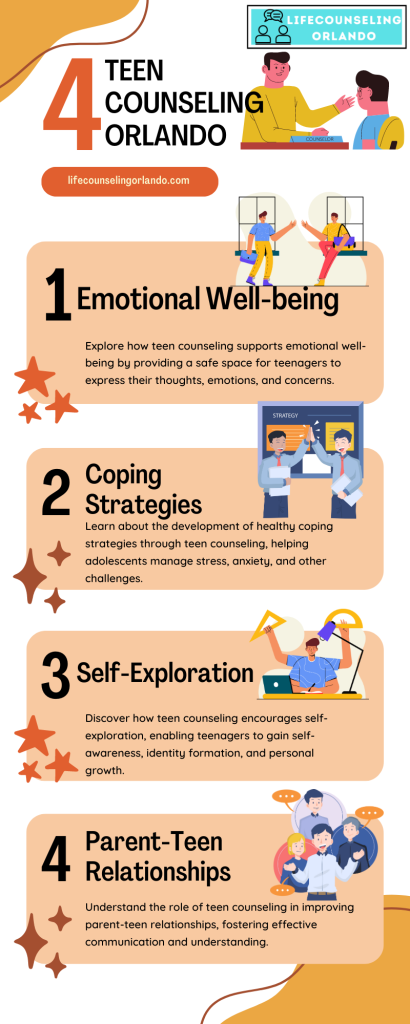
Teen Counseling and Is It Effective?
At first a highly resistant adolescent will not want to include their parents in sessions.
This is usually because the teen is fearful of what a parent might say or do.
This also may be because they are unable or have never had the role modeling to effectively express their anger, fears, needs and concerns.
It is important for the therapist to always work towards improving the whole system (family) and allow all members to learn new effective ways of communication, listening, dealing with stress and creating new rules and guidelines that will support and encourage the adolescent to feel safe.
Parenting
Parents also need to feel included and educated on how to assist their adolescent, and learn the important skills to no longer enable their teen.
Working with adolescents is highly effective when the therapist and adolescent are working as a team and the adolescent knows that when they come to see me they have a safe place to express themselves and trust that I have nothing but their best interest at hand.
Once this therapeutic bond has been established it’s amazing to see the growth and changes teens can make.
Doing your own work as an adult is helpful so that you can see if control, issues of codependency and helicopter parenting are present.
“Why am I so passionate about Teen and Adolescent Counseling Orlando relate to being a troubled teen growing up in a strict and authoritative environment. With little to no room to voice my opinion. To come to my own truths and opinions.
Separate from the adults and society around me. Today’s adolescents grow up at such a young age.
The messages they receive from the media and society are constant and confusing. We are seeing more and more teens willing to seek and attend therapy.
Many feel lost or confused. The idea of having a safe place to let it all out and not feel judged or shamed is next to impossible for our youth today to find.
Many do not have the skill set to verbalize the multitude of emotions they feel.
I excel at gaining the teens respect and trust in order to open up. Getting a teen to see their true value and worth is vital.
It helps them learn to cope in today’s world. I work with teens and children to learn better ways to communicate their needs.
I require the family be involved in the process only when and if the teen feels confident.
Often I hear the parents ask me to “fix their teen.” This is amusing when 85% of the time, the parents have played the largest role.
They have conditioned and shaped the teens mindset and beliefs. I help parents identify warning signs and effective ways to reach their teens.
This enables parents to assist their adolescent in moving towards self awareness, stability, and improvement.
Discover the tools to effectively talk to your teen today.
How much is too much and how far is too far?
How do I get help for my teens defiant and destructive behaviors?
How do I know if my child has ADHD, and can I help without medications?
Learning how to set healthy limits and boundaries for yourself and your teen in recovery.
Understanding the signs and what to look for in your teen.
Why are so many teens suffering with the most basic social and emotional skills? Are the parents enabling their teens? Therefore understanding from a therapist’s viewpoint why therapy is becoming less effective due to the parents role is important.
How do we effectively reach our depressed teens? Understand the vital role you play as a parent and how counseling can be effective.
Understand that your teen has a voice of their own. They need to feel they can express it in a healthy way. Don’t live through them and don’t deny them a voice.
Understanding the Adolescent Mind
Adolescence is a transformative period characterized by rapid physical and hormonal changes, as well as significant emotional and psychological development. To effectively address the challenges faced by teenagers, it is essential to understand the unique aspects of their minds and experiences.
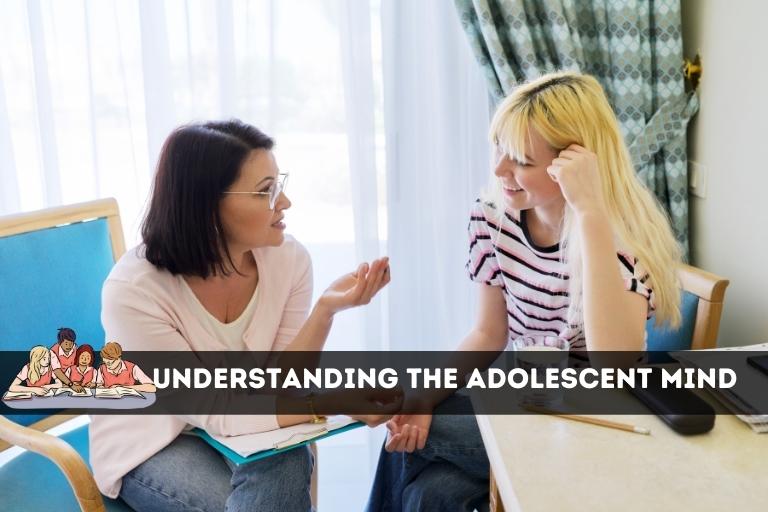
Physical and Hormonal Changes
Teenagers experience a range of physical changes during puberty, including growth spurts, changes in body shape, and the development of secondary sexual characteristics. These changes can have a profound impact on their self-image and body confidence. Moreover, hormonal fluctuations contribute to mood swings, increased impulsivity, and heightened emotional responses.
Emotional and Psychological Development
During adolescence, individuals undergo significant emotional and psychological development. They strive for independence, explore their identities, and establish their values and beliefs. This process often involves questioning authority, forming new friendships, and engaging in self-discovery. It is also a period of increased self-consciousness and a heightened focus on peer acceptance.
Peer Pressure and Social Challenges
Peer pressure and social challenges are prevalent during the teenage years. Adolescents often feel the need to conform to social norms and face the pressure to fit in. This can lead to risky behaviors, such as substance abuse, bullying, and unhealthy relationships. Navigating these social dynamics can be overwhelming and impact mental health.
Impact of Technology and Social Media
The rise of technology and social media has profoundly influenced the lives of teenagers. While it offers opportunities for connection and self-expression, it also presents challenges. Cyberbullying, excessive screen time, and the constant exposure to curated online identities can negatively affect teenagers’ mental health, self-esteem, and body image.
Common Issues Addressed in Teen Counseling
Teen counseling covers a wide range of issues that adolescents may face. By seeking professional help, teenagers can learn coping strategies, develop resilience, and navigate these challenges successfully.
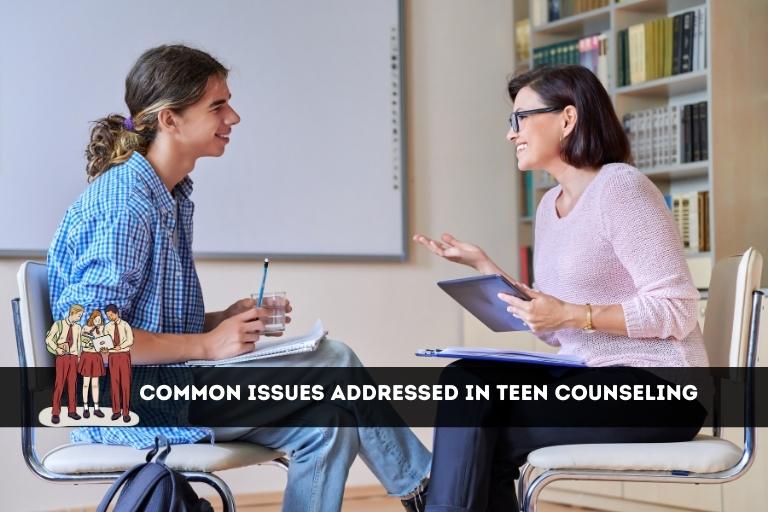
Anxiety and Stress Management
Anxiety disorders, including generalized anxiety disorder and social anxiety disorder, are common among teenagers. Academic pressure, social expectations, and uncertainty about the future contribute to elevated stress levels. Teen counseling provides tools and techniques to manage anxiety effectively and develop healthy stress management skills.
Academic Pressure and Performance Anxiety
With increasing academic demands, many teenagers experience performance anxiety and stress related to exams, projects, and college applications. Teen counseling can help adolescents develop effective study habits, time management skills, and strategies to cope with academic pressure.
Depression and Mood Disorders
Depression and mood disorders can significantly impact teenagers’ well-being. Symptoms may include persistent sadness, loss of interest, changes in appetite and sleep patterns, and difficulty concentrating. Teen counseling aims to identify the underlying causes of depression and provide therapeutic interventions to improve mood and overall mental health.
Self-Esteem and Body Image Issues
Adolescence is a time when body image concerns often arise. The pressure to meet societal beauty standards can lead to negative self-perception and low self-esteem. Teen counseling helps individuals develop a positive body image, build self-confidence, and develop healthy relationships with their bodies.
Substance Abuse and Addiction
Experimentation with substances is a common risk during adolescence. Teen counseling plays a crucial role in addressing substance abuse issues, helping teenagers understand the risks associated with drug and alcohol use, and providing support for recovery.
Family Conflicts and Communication Problems
Conflicts within the family unit can significantly impact teenagers’ well-being. Communication breakdown, differing expectations, and generational gaps often contribute to strained relationships. Teen counseling offers a safe space for families to address conflicts, improve communication, and rebuild healthy relationships.
Approaches and Techniques in Teen Counseling
Teen counseling incorporates various therapeutic approaches and techniques tailored to the specific needs of adolescents. These approaches provide effective tools for self-reflection, problem-solving, and personal growth.
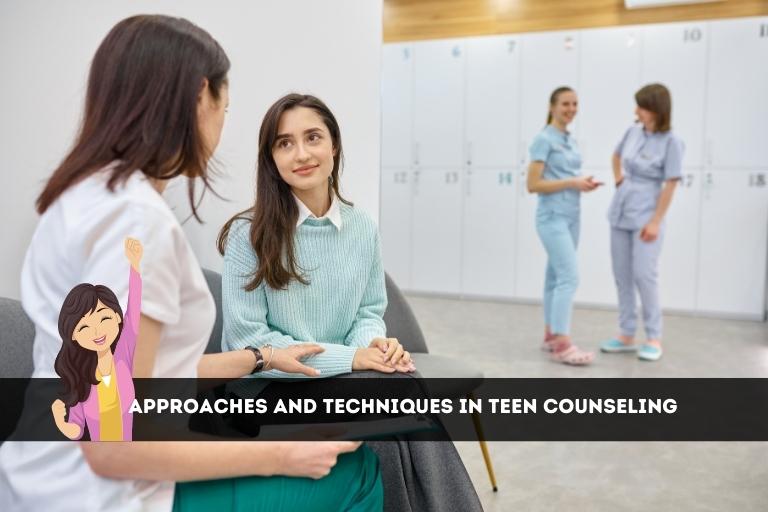
Cognitive-Behavioral Therapy (CBT)
CBT is a widely used therapeutic approach that helps individuals identify negative thought patterns and behaviors and replace them with positive ones. In teen counseling, CBT helps adolescents challenge distorted thinking, manage emotions, and develop healthy coping mechanisms.
Dialectical Behavior Therapy (DBT)
DBT combines elements of CBT with mindfulness practices. It focuses on developing skills to regulate emotions, tolerate distress, and improve interpersonal relationships. DBT is particularly effective in addressing self-destructive behaviors and mood instability.
Solution-Focused Brief Therapy (SFBT)
SFBT is a goal-oriented approach that emphasizes finding solutions rather than dwelling on problems. It helps teenagers identify their strengths, set achievable goals, and develop strategies to reach them. SFBT promotes a positive outlook and empowers adolescents to take control of their lives.
Mindfulness-Based Approaches
Mindfulness-based approaches, such as mindfulness meditation and yoga, promote self-awareness and emotional regulation. These techniques help teenagers manage stress, reduce anxiety, and improve overall well-being.
Group Therapy and Support Groups
Group therapy and support groups offer adolescents a sense of belonging and a safe space to share their experiences. It provides peer support, validation, and opportunities to learn from others who may be facing similar challenges. Group settings encourage social connection and skill-building.
Art Therapy and Expressive Therapies
Art therapy and expressive therapies, such as music or drama therapy, provide alternative modes of expression for teenagers who may struggle with verbal communication. These creative approaches can help adolescents explore their emotions, process traumatic experiences, and gain insights into their thoughts and feelings.
The Role of Parents and Guardians
Parents and guardians play a vital role in supporting teenagers’ mental health and well-being. By fostering a positive and supportive environment, they can help adolescents navigate the challenges they face.
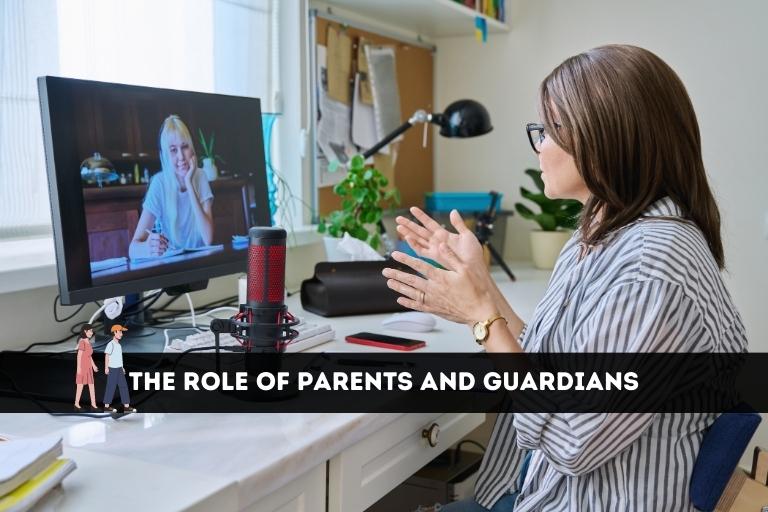
Building Trust and Open Communication
Building trust and maintaining open lines of communication are essential in parent-teen relationships. By actively listening, showing empathy, and validating their experiences, parents can create a safe space for teenagers to express their thoughts and emotions.
Setting Boundaries and Rules
Establishing clear boundaries and reasonable rules helps teenagers develop self-discipline, responsibility, and accountability. Consistent enforcement of these boundaries provides structure and fosters a sense of security.
Encouraging Healthy Habits and Coping Mechanisms
Promoting healthy habits, such as regular exercise, balanced nutrition, and sufficient sleep, contributes to overall well-being. Encouraging teenagers to engage in activities they enjoy and teaching them healthy coping mechanisms, such as journaling or mindfulness exercises, helps them manage stress effectively.
Seeking Professional Help When Needed
Recognizing the signs of mental health issues and seeking professional help when needed is crucial. Parents should be proactive in identifying changes in behavior, mood, or academic performance that may indicate the need for teen counseling. Seeking help early can prevent issues from escalating.
Benefits of Teen Counseling
Teen counseling offers numerous benefits that contribute to teenagers’ overall well-being and personal growth. By addressing their challenges and building resilience, counseling can empower adolescents to thrive in various areas of their lives.

Improved Emotional Well-being
Teen counseling equips adolescents with the necessary tools to manage emotions, develop self-awareness, and build emotional resilience. By addressing underlying issues and providing coping strategies, counseling improves overall emotional well-being.
Enhanced Coping Skills
Counseling provides teenagers with valuable coping skills to navigate challenges effectively. These skills include stress management techniques, problem-solving strategies, and healthy communication skills. Improved coping mechanisms enable teenagers to handle adversity and setbacks with greater resilience.
Better Academic Performance
Addressing academic pressure and related stressors through counseling can significantly improve teenagers’ academic performance. By helping them develop effective study habits, time management skills, and stress reduction techniques, counseling enables students to reach their full academic potential.
Strengthened Relationships and Social Skills
Teen counseling fosters the development of healthy relationships and social skills. Through therapy, teenagers learn effective communication, conflict resolution, and empathy, which positively impact their relationships with peers, family members, and other important individuals in their lives.
Seeking Teen Counseling: How to Get Started
Taking the first step towards teen counseling can be intimidating for both teenagers and their parents. However, with the right guidance, the process can be smooth and beneficial.
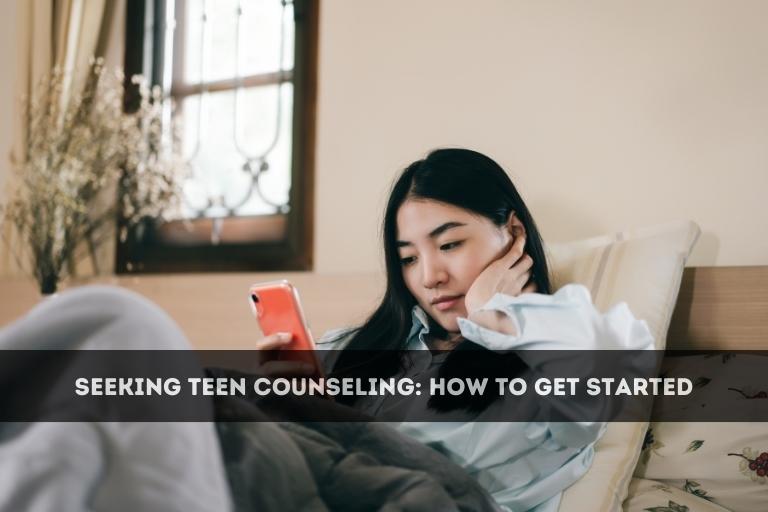
Recognizing the Need for Counseling
Recognizing the signs that indicate the need for counseling is the first step. Changes in behavior, sudden mood swings, academic decline, withdrawal from social activities, or persistent feelings of sadness or anxiety may indicate the need for professional help.
Finding a Qualified Teen Counselor
Finding a qualified teen counselor is essential for a successful counseling experience. Seek recommendations from trusted sources, such as school counselors, pediatricians, or mental health professionals. Consider the counselor’s qualifications, experience, and specialization in working with teenagers.
Initial Consultation and Assessment
An initial consultation and assessment allow the counselor to understand the teenager’s needs, concerns, and goals. This session also provides an opportunity for the teenager and parents to ask questions and establish rapport with the counselor.
Confidentiality and Privacy Concerns
Confidentiality and privacy are paramount in teen counseling. Counselors adhere to strict ethical guidelines to ensure that the information shared during sessions remains confidential, except in situations where there is a risk of harm to the teenager or others.
Active Involvement in the Counseling Process
Active involvement of both the teenager and parents in the counseling process is crucial for its effectiveness. Encourage open communication with the counselor, attend scheduled sessions, and follow through with any recommended activities or exercises outside of sessions.
FAQ of Teen Counseling Orlando
What is the ideal age to start teen counseling?
The ideal age to start teen counseling may vary depending on the individual and their specific needs. However, counseling can be beneficial as soon as signs of emotional distress, behavioral changes, or academic struggles become evident.
How long does teen counseling typically last?
The duration of teen counseling varies depending on the nature and complexity of the issues being addressed. It can range from a few weeks to several months or even longer. The counselor will assess progress and make recommendations based on the teenager’s needs.
Can parents be involved in the counseling sessions?
Yes, parents can be involved in the counseling sessions. Family therapy sessions or periodic meetings with parents may be scheduled to discuss progress, address family dynamics, and provide support and guidance.
Will the counselor share information with parents?
Confidentiality is a crucial aspect of teen counseling. While counselors respect the privacy of their clients, they may involve parents in certain situations, especially when there are safety concerns or the teenager is at risk. The counselor will explain the limits of confidentiality at the beginning of the counseling process.
How can I know if my teenager needs counseling?
Signs that your teenager may benefit from counseling include persistent changes in behavior, mood swings, academic decline, withdrawal from social activities, substance abuse, self-harm, or expressing thoughts of self-harm or suicide. If you have concerns, consulting with a mental health professional can help determine if counseling is appropriate.
Conclusion
Teen counseling plays a significant role in supporting adolescents through the challenges of growing up.
By addressing various issues, providing effective therapeutic approaches, involving parents, and offering a safe space for self-expression, teen counseling empowers teenagers to navigate their journey with resilience, self-awareness, and improved emotional well-being.
Seeking professional help when needed is an important step towards ensuring teenagers receive the support they need to thrive.
